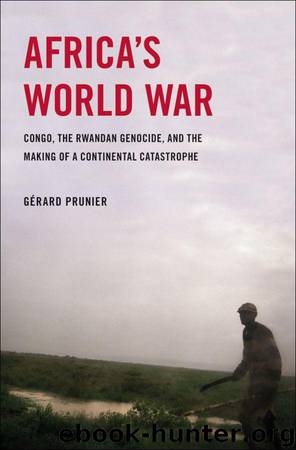Africa's World War: Congo, the Rwandan Genocide, and the Making of a Continental Catastrophe by Prunier Gerard

Author:Prunier, Gerard [Prunier, Gerard]
Language: eng
Format: mobi
Publisher: Oxford University Press
Published: 2008-12-01T16:00:00+00:00
Diplomacy slowly deconstructs the continental conflict
The actors start jockeying for position
What was the situation of the continental war in early 2001? First of all, one of weariness. The various actors had entered the conflict out of often unrelated interests, and most of these had started to disassemble. Angola had saved Laurent-Désiré Kabila at the last minute because it feared that the Rwandese adventurers who were trying to overthrow him could at any time broaden their tactical deal with Savimbi into a strategic alliance. In 1998 Savimbi had been a major threat who seemed capable of attacking Luanda. But by 2001 he was a spent force, trying with great difficulty to survive. Zimbabwe had jumped in to protect its investments and to block South Africa’s political ascent on the continent. By 2001 it had failed on both counts, and its regime was struggling to survive in the face of mounting opposition, both at home and internationally. Windhoek had joined only because of SADC big boy pressure, and by 2001, faced with the growing indifference of one ally and the exhaustion of the other, it wanted out. As for the “aggressors,” they remained involved, but only slightly. Burundi had always been a marginal force, more concerned with securing the Congolese side of its domestic security situation than with a real war of conquest. By 2001 its domestic situation was worse than ever and being in the Congo seemed to be of only marginal interest for improving it. As for Rwanda and Uganda, their mutual bitterness was so intense after the three Kisangani “wars” that it was hard to decide whom they hated most, each other or their supposed common enemy. In addition, President Museveni’s grandiose dreams of trans-African statesmanship had come to naught, and he was under continuous donor pressure to reduce his military budget in order to keep Uganda’s valuable Heavily Indebted Poor Countries (HIPC) status. Unlike Kagame in Rwanda, he was not under strong demographic or political pressure inside his own country, and the looting of the Congo had been more a factor of personal enrichment for some of the members of his regime than a useful tool of economic imperialism. As a result Kampala’s heart was not strongly in the game even if some of the top UPDF officers remained eager to stay for purely financial reasons.45 This left Rwanda as the only country both able and willing to go on. The reasons were multiple: security, economic benefits, relieving demographic pressure, keeping an oversize army happy,46 surfing on foreign guilt about the genocide, and following the spirit of the RPF’s Spartan political culture, which over the past twenty years had repeatedly considered war to be the solution to all problems. But even if the causes of involvement in the DRC had considerably receded, all the players remained wary of each other and watched their rivals for signs of disengagement before making their own moves.
Kagame was the first to react, declaring that he was ready to evacuate Pweto, “which is
Download
This site does not store any files on its server. We only index and link to content provided by other sites. Please contact the content providers to delete copyright contents if any and email us, we'll remove relevant links or contents immediately.
| Arms Control | Diplomacy |
| Security | Trades & Tariffs |
| Treaties | African |
| Asian | Australian & Oceanian |
| Canadian | Caribbean & Latin American |
| European | Middle Eastern |
| Russian & Former Soviet Union |
The Secret History by Donna Tartt(19058)
The Social Justice Warrior Handbook by Lisa De Pasquale(12187)
Thirteen Reasons Why by Jay Asher(8894)
This Is How You Lose Her by Junot Diaz(6877)
Weapons of Math Destruction by Cathy O'Neil(6267)
Zero to One by Peter Thiel(5789)
Beartown by Fredrik Backman(5737)
The Myth of the Strong Leader by Archie Brown(5500)
The Fire Next Time by James Baldwin(5432)
How Democracies Die by Steven Levitsky & Daniel Ziblatt(5216)
Promise Me, Dad by Joe Biden(5144)
Stone's Rules by Roger Stone(5081)
A Higher Loyalty: Truth, Lies, and Leadership by James Comey(4954)
100 Deadly Skills by Clint Emerson(4921)
Rise and Kill First by Ronen Bergman(4780)
Secrecy World by Jake Bernstein(4742)
The David Icke Guide to the Global Conspiracy (and how to end it) by David Icke(4709)
The Farm by Tom Rob Smith(4502)
The Doomsday Machine by Daniel Ellsberg(4485)
